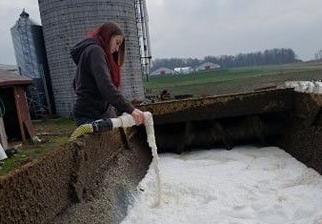
In one familiar story, he presided over a dispute between two women claiming to be the mother of an infant. He said he would cut the child in half and each woman would receive a portion, to which the natural mother said, “No.”
King Solomon knew that the natural mother would rather give up her child than allow it to be killed.
In the past during my tenure on the Pennsylvania Milk Marketing Board, I had joked about feeling as if we were all asked to play the part of King Solomon — making tough decisions that seem at first to be impossible in terms of fairness. I can assure my readers that then and now with the current board, the decisions made are no joking matter.
Handling the crisis of disruption of the milk pipeline during the onset of the pandemic involved a series of difficult decisions. It seemed as if we were constantly seeking ways to be fair to all our constituents, and several things had to be considered on a case-by-case basis.
One of those situations surrounded the issue of farmers being asked to dump milk on the farm and how they might, if at all, be compensated for the loss.
Fortunately, federal funds were made available to states to provide relief to those farmers. Unfortunately, the availability of those funds ended on Nov. 30.
Fairness is Not Always Easy
The board is almost constantly weighing decisions that deal with oversupply of milk, stressors imposed by what many believe is an outdated federal pricing system, and ensuring that our regulations are enforced equally across a diversity of producers and processors. These decisions sometime appear to pit one group against another, which is the thing we most wish to avoid.
A constant in the background of all staff and board work is a reluctance to impose any new regulation, orders or changes that will increase the price of dairy products to commonwealth consumers. While these increases may often be influenced by factors out of our control, the industry often bears the blame (as does the board) when they occur.
Sometimes we do not have a choice. Those are the times that generate the most angst for all of us.
Few people would deny that farmers work hard, and anyone who has spent time on a dairy farm knows about the necessary commitment. Of course, when I was growing up, cows were only milked twice per day; getting up at 4:30 in the morning to get the day started and finishing up in the late afternoon were the norm. By the time dinner was over, it was bedtime with the knowledge that another morning starting at 4:30 was on the horizon.
Under those types of circumstances the financial struggles faced by our dairy farmers over the past few years seem like such an unfair burden.
I spoke to a farmer who lives in my county who lost three times his weekly feed costs while dumping milk (with no reimbursement). What can I say to cause less stress for this farmer? The bottom line is, “nothing.”
What I can do and what is supported by the board is to tell each person involved with the dairy industry in Pennsylvania that we care and that we strive to do our jobs in the most fair and impartial way possible. No one group of constituents is favored over the other, even though we sometimes must make decisions for the greater good at the sacrifice of others.
PMMB is committed to improving the dairy industry in ways we can given any limitations imposed by our regulatory responsibilities.
We are also available to respond to any questions or concerns. I can be reached at 717-210-8244 or by email at chardbarge@pa.gov.
Carol A. Hardbarger is the secretary of the Pennsylvania Milk Marketing Board.

























